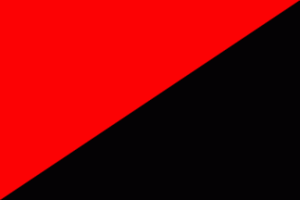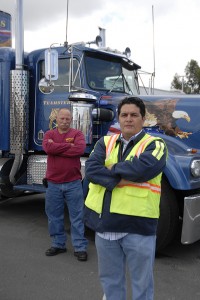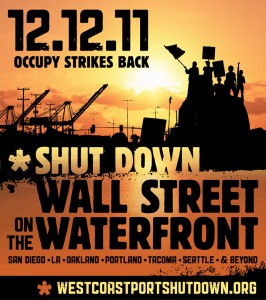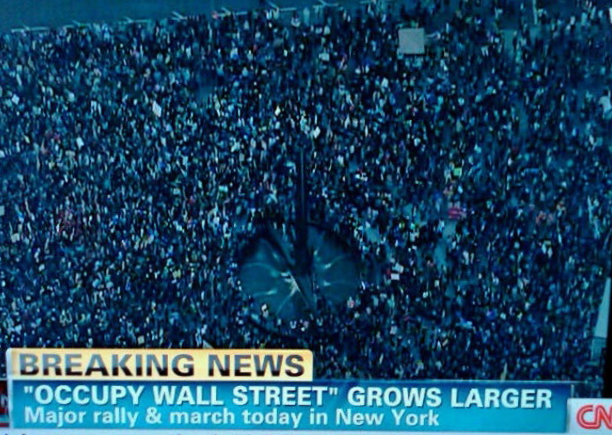Occupy groups urge defeat of proposed law. [UPI.com] -Two Chicago-area Occupy protest groups warned city aldermen that supporting Mayor Rahm Emanuel’s “Sit Down and Shut Up” ordinance will be met with resistance.
Occupy
Capital Gains Biggest Driver of Income Inequality
The biggest driver of income inequality: capital gains. [The Washington Post] – Changes in income from capital gains and dividends were the single largest contributor to rising income inequality between 1996 and 2006, according to a new report from the Congressional Research Service, the nonpartisan public policy branch of Congress.
With Love, From Occupy Wall Street
This is the official video from Occupy Wall Street to thank supporters. It was approved by consensus through the New York City General Assembly last week.
ONE BIG UNION
From Matthew Grimm and The Red Smear, here’s one of the most inspiring songs I’ve heard in a very long time.
Anarchism To The Rescue
 When someone says the word “Anarchist” what images come to your mind? Are they cartoonish little guys in black fedoras and trench coats carrying bombs? Is the one “fact” you remember about Anarchists from your high school world history classes that one of them was “to blame for the First World War?”
When someone says the word “Anarchist” what images come to your mind? Are they cartoonish little guys in black fedoras and trench coats carrying bombs? Is the one “fact” you remember about Anarchists from your high school world history classes that one of them was “to blame for the First World War?”
Entire volumes have been written in an attempt to explain what Anarchism is, how it developed and why it may still be relevant today. At its center, though, is the longing for freedom and for solidarity within the working class.
Nathan Schneider has written an excellent essay for The Nation, exploring what Anarchist roots have brought to the Occupy movement.
At its core, anarchism isn’t simply a negative political philosophy, or an excuse for window-breaking, as most people tend to assume it is. Even while calling for an end to the rule of coercive states backed by military bases, prison industries and subjugation, anarchists and other autonomists try to build a culture in which people can take care of themselves and each other through healthy, sustainable communities.
Schneider outlines some of the limitations that these roots seem to have placed on the Occupy movement, and the frustrations that a stubborn commitment to consensus has caused for traditional political leaders and groups. He cautions us to recognize what the movement is not (and will never be), but also points to what it has already done. “They’ve reminded us that politics is not a matter of choosing among what we’re offered but of fighting for what we and others actually need‚ not to mention what we hope for.”

###
Read Nathan Scneider’s Essay: Thank You Anarchists [The Nation]
Learn More About Anarchism: AK Press
A Definitive History of Anarchism: Black Flame: The Revolutionary Class Politics of Anarchism and Syndicalism, Michael Schmidt and Lucien van der Walt
Emanuel Wants Big Fines for Protesters
Although he says that both freedom of speech and law and order will prevail in the city, somehow I doubt it.
Emanuel Wants Big Fine Increases for G8 Protesters [Chicago Tribune] – Mayor Rahm Emanuel wants to raise fines for resisting police as the city gears up for anticipated protests that will come with the G8 and NATO summits to be held in Chicago next May.
OWS and the Unions
 Yesterday’s direct action at the West Coast ports, though it failed to completely shut down shipping as was hoped, did cause significant disruption to business in many locations from San Diego to Anchorage. The protestors were able to cause a major marine terminal (Portland) to close. They brought things to a standstill for a time in Oakland and in Longview, Washington. They slowed business in Long Beach, in Seattle and elsewhere.
Yesterday’s direct action at the West Coast ports, though it failed to completely shut down shipping as was hoped, did cause significant disruption to business in many locations from San Diego to Anchorage. The protestors were able to cause a major marine terminal (Portland) to close. They brought things to a standstill for a time in Oakland and in Longview, Washington. They slowed business in Long Beach, in Seattle and elsewhere.
Much of the media coverage of this action has centered on how the protests were viewed by organized labor, and on the broader issue of the relationship between the Occupy Wall Street movement and the unions. Some reports even played-up rifts between the protestors and workers. Mid-morning yesterday, a story from CBS News showed up in my aggregator with this summary. “Anti-Wall Street activists plan blockades to support dockworkers’ labor struggle, but union doesn’t want their help.”
Later in the day a lot of OWS supporters were linking to this post from CleanAndSafePorts.org that’s titled An Open Letter from America’s Port Truck Drivers on Occupy the Ports. It’s signed by drivers of many years standing who were elected to speak on behalf of local committees from Long Beach, Seattle & Tacoma, Los Angeles, Oakland and New York & New Jersey. It presents a fairly nuanced description of their issues and their feelings about the OWS Action. Here’s an excerpt.
We are inspired that a non-violent democratic movement that insists on basic economic fairness is capturing the hearts and minds of so many working people. Thank you “99 Percenters” for hearing our call for justice. We are humbled and overwhelmed by recent attention. Normally we are invisible.
I would encourage you to read the entire letter to learn more about these workers’ lives and the difficulties that they face each day, as well as their (somewhat ambivalent) feelings about the direct action yesterday.
In parts of the country, there have been rather rocky relations between some organized labor groups and the OWS protestors from the very beginning. One need only read a few of the local General Assembly minutes to notice that. Some union leaders seemed suspicious (and perhaps even a little jealous) of a “Johnny come lately” grassroots populist movement shouting about issues of economic injustice around which Labor has been organizing for more than a century. By the same turn, many folks in the Occupy movement seemed suspicious of any of the big institutions of our society, labor unions included. Though there have been many instances of mutual support for causes and actions, it sometimes remains an uneasy alliance.
The sound bites and the headlines miss a lot of the underlying issues – structural, legal and ideological – that have set the stage for the interaction between OWS and the unions. Some of those issues have as much to do with the history of the Labor Movement in the United States as they do with any unique current conditions.
I would highly recommend an article from Richard Myers over on Daily Kos titled Unions, OWS, and Blocking The Ports. He observes that “the union roots of OWS are much broader and deeper than most observers realize.” He particularly notes the similarity in philosophy and tactics shared by OWS and the Industrial Workers of the World (horizontal democratic structure, emphasis on direct action, etc.).
As Richard notes, part of what may be playing out here is the tension between an increasingly radical local rank and file, and the stodgy reactionism of their national union leaders. He concludes, “There is no reason in the world to turn against OWS on the false basis that OWS doesn’t respect workers’ rights. OWS is all about workers’ rights. The really big question is: how far will national leaders of business unions go for the workers?”
It seems to me that he hits the nail directly on the head.
###
Read Richard Myers’ article at Daily Kos.
Learn more about the West Coast ports direct action.
Find out about the IWW.
West Coast Port Shutdown
Thousands of activists began to gather in the early morning hours today to protest at ports along the West Coast of the United States. Events are planned throughout the day from San Diego to Seattle.
You can follow what’s happening live on Twitter @occupytheport. You can also follow the #D12 hashtag for reports and comments from the community at large.
Regrets From A Chase Regional VP
A Banker Speaks, With Regret – NYTimes.com.
…some account executives earned a commission seven times higher from subprime loans, rather than prime mortgages. So they looked for less savvy borrowers — those with less education, without previous mortgage experience, or without fluent English — and nudged them toward subprime loans.
Nicholas Kristof of the New York Times recently spoke with James Theckston, who was a Regional VP for Chase during the housing boom. Theckston now speaks with regret about his culpability in the financial meltdown, as well as that of his bosses.
…they figured we’re going to make billions out of it, so who cares? The government is going to bail us out. And the problem loans will be out of here, maybe even overseas.

The World Is Not The Same Anymore
Yesterday I watched in dumbstruck awe as tens of thousands gathered in New York City and throughout our nation for a day of action, commencing with a demonstration in the financial district and culminating in a nice little stroll by more than 30,000 across the Brooklyn Bridge (and other bridges around the country).
The significance of these events has still not quite set in. It is clear that this movement is not going away. Other than that, the moment is simply too large for me to grasp.
Remember those images from the Arab Spring? Tens of thousands rose up against military dictatorships and toppled them by their mere refusal to be obedient any longer.
As nearly as I can reckon, this is like that.
Full Coverage From OccupyWallSt.org: November 17: Historic Day of Action for the 99%.

